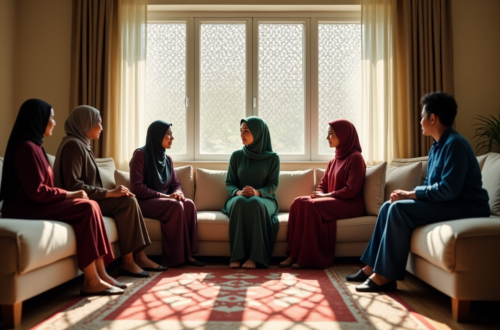Do You Know what Islam teaches about finding a partner. Choosing a life partner is not only a legal contract but also a spiritual bond that helps foster love, compassion, and mutual respect between partners. Islam places significant emphasis on the process of selecting a life partner, as it is believed to have long-lasting impacts on both individual happiness and the stability of society. The teachings of Islam offer clear guidance on the qualities to seek in a potential spouse.
In this article, we will explore the key principles and guidelines Islam offers for choosing a life partner.
Join India’s leading Muslim Matrimonial platform, salaamsoulmate.com, and connect with your perfect match today!
Register Now1. Marriage as a Sacred Bond
In Islam, marriage is regarded as a sacred contract (known as Nikah) between a man and a woman. It is designed to be a lifelong union based on mutual respect, love, and compassion. The Quran states:
“And among His signs is that He created for you from among yourselves mates that you may find tranquility in them, and He placed between you affection and mercy. Indeed, in that are signs for a people who give thought.” (Quran 30:21)
This verse emphasizes that marriage is not merely about physical attraction or societal expectations. It is about seeking peace (sakinah), love (mawaddah), and mercy (rahmah). Therefore, the selection of a life partner is an important decision that should be guided by Islamic principles.
2. Qualities to Choosing a Life Partner
Islam outlines several qualities that should be sought in a potential spouse. These qualities go beyond superficial traits like physical appearance or wealth, focusing instead on the character and values that would contribute to a successful and fulfilling marriage.
a) Religious Commitment and Piety
One of the most important factors to consider when choosing a life partner in Islam is their faith and commitment to Islam. A person who is devoted to following Islamic principles, both in personal worship and in dealings with others, is likely to create a harmonious and respectful home environment.
The Prophet Muhammad (peace be upon him) said:
“A woman is married for four things: her wealth, her lineage, her beauty, and her religion. So marry the one who is religious, and you will prosper.” (Sahih al-Bukhari)
Islam teaches that religious compatibility is crucial because a spouse who fears Allah is more likely to maintain ethical conduct, support their partner in matters of faith, and contribute positively to the moral upbringing of children.
b) Good Character and Morality
In Islam, good character is a highly valued trait in a spouse. Honesty, integrity, kindness, and humility are fundamental qualities that should be sought in a partner. The Prophet Muhammad (peace be upon him) emphasized the importance of character by saying:
“The best of you are those who have the best character.” (Sahih Muslim)
Character influences how a person behaves in marriage, handles conflicts, and treats their spouse with respect. A person of good character will be more understanding, patient, and supportive, making it easier to establish a healthy and loving marriage.
c) Mutual Respect and Compatibility
Islam teaches that a marriage should be built on mutual respect and understanding. Partners should have the ability to appreciate each other’s differences, support one another, and work together to achieve common goals. Compatibility in values, beliefs, and lifestyles is important, as it helps prevent friction and creates a sense of unity in the relationship.
The Prophet Muhammad (peace be upon him) also advised:
“A believer should not hate a believer. If he dislikes one of his qualities, he should be pleased with another.” (Sahih Muslim)
Mutual respect allows for a strong emotional connection and a balanced relationship where both individuals feel valued and heard.
d) Family and Social Background
Islam also encourages considering a person’s family background when choosing a life partner. While this does not mean that a person’s worth is solely based on their lineage. Also having a supportive family environment can contribute to the stability of the marriage.
e) Health and Compatibility in Lifestyle
Physical health and compatibility in terms of lifestyle choices, such as attitudes toward parenting, health, and finances, are also important. While Islam does not place as much emphasis on physical appearance as some other cultures do, a partner’s physical health and fitness can influence the overall quality of life and family well-being. Furthermore, a spouse should be able to lead a lifestyle compatible with Islam, including shared values regarding diet, cleanliness, and habits.
3. Consulting with Family and Community
Islam encourages to choosing a Life partner in the involvement of the family and community in the marriage process. The prospective as spouse’s family, particularly their parents, play a crucial role in guiding the couple through this important decision. The Prophet Muhammad (peace be upon him) advised the companions to seek advice from family and friends when making major decisions.
4. The Role of Consultation and Prayer (Istikhara)
In Islam, making important decisions, such as Choosing a life partner, should be done with the guidance of Allah. The practice of seeking Allah’s help through prayer is known as Istikhara—a prayer for seeking divine guidance when facing uncertainty. Before committing to a relationship, many Muslims choose to pray Istikhara, asking Allah to lead them to the best choice for their future.
The Prophet Muhammad (peace be upon him) taught:
“If any one of you is concerned about a decision he must make, let him pray two units of prayer (Salah) other than the obligatory ones, and ask Allah to guide him.” (Sahih al-Bukhari)
5. Avoiding Haste and Seeking Patience
The Prophet Muhammad (peace be upon him) warned against hasty decisions and advised his followers to take the time to properly assess their potential partner’s character and faith.
“When a man proposes to a woman, if you are pleased with her character and religious commitment, then marry her.” (Sunan Ibn Majah)
Patience and deliberation are important steps in ensuring that the decision is based on understanding, rather than impulsiveness.
6. Maintaining Emotional and Mental Readiness
Islam teaches that both parties should be emotionally and mentally prepared for the responsibilities of marriage. This includes the ability to Choosing a Life Partner engage in effective communication, solve problems together, and provide emotional support.
It is essential that both partners understand their roles and responsibilities within the marriage.
7. The Islamic Perspective on Marriage and Divorce
Finally, Islam acknowledges that not all marriages will remain successful, and the process of choosing a partner is not always foolproof. While Islam teaches about choosing a life partner, encourages marriage and emphasizes the importance of maintaining strong relationships, it also recognizes that in some cases, divorce may be necessary for the well-being of both individuals.
The Prophet Muhammad (peace be upon him) said:
“Of all the lawful things, divorce is the most hated by Allah.” (Sunan Ibn Majah)
This statement underscores that divorce should be avoided if possible, but it also shows that Islam acknowledges that there are situations where a separation may be in the best interest of both parties. However, the principles of respect, fairness, and kindness should guide every aspect of a marriage, even in difficult times.
Read more about marriage here.
Conclusion
While Choosing a life partner in Islam is a thoughtful and deliberate process based on religious values, good character, mutual respect, and emotional readiness. Islam encourages a holistic approach that considers both spiritual and practical factors to ensure a successful marriage. By following the teachings of the Quran and the Hadith, Muslims can make informed, responsible decisions about their future spouses, leading to healthy, loving, and enduring relationships. Ultimately, Islam emphasizes that marriage is not just a contract but a partnership of trust, love, and devotion that brings blessings from Allah.






